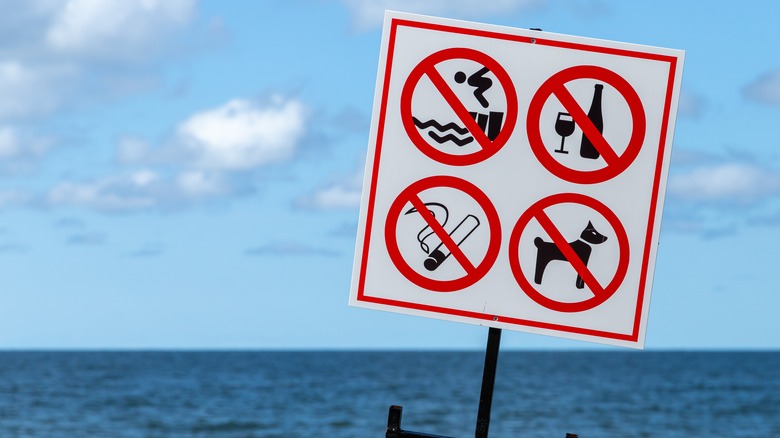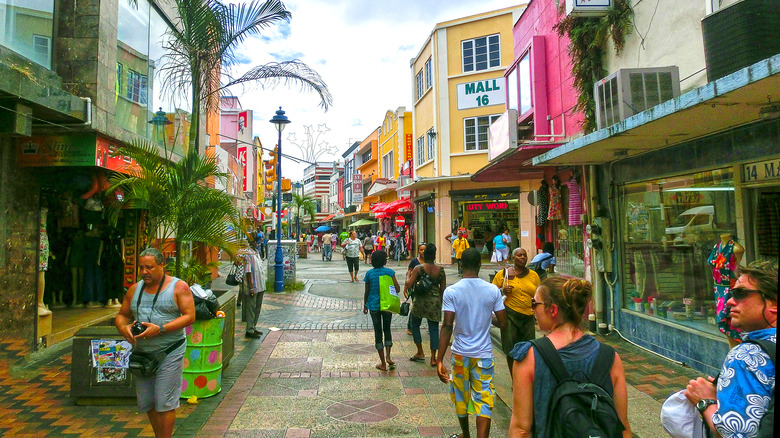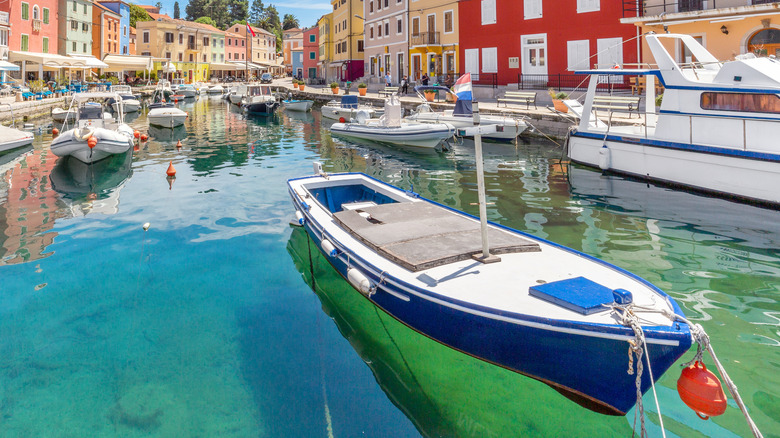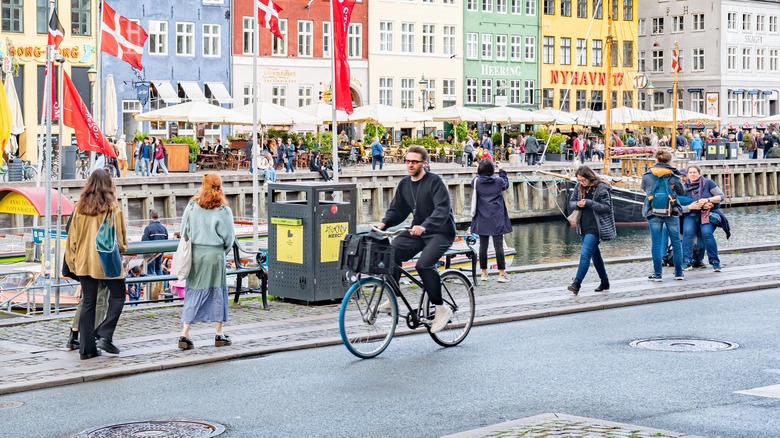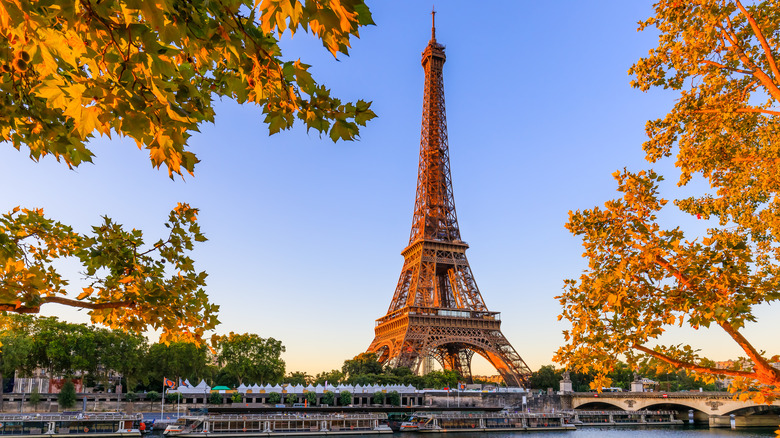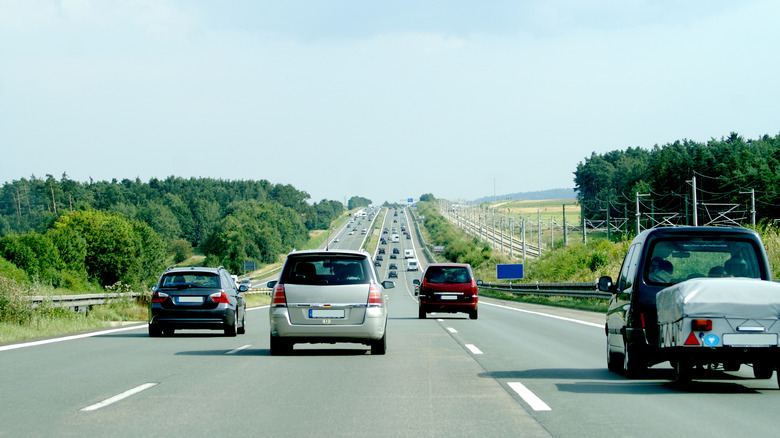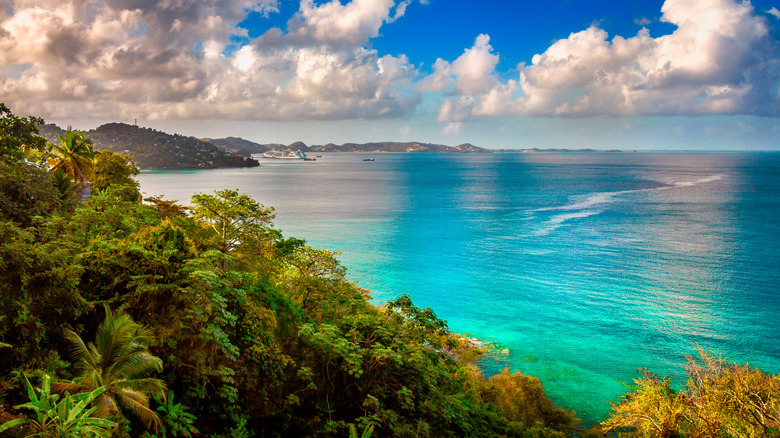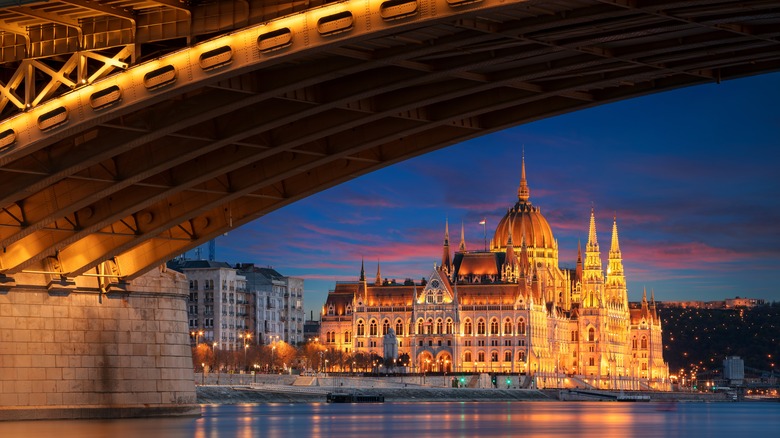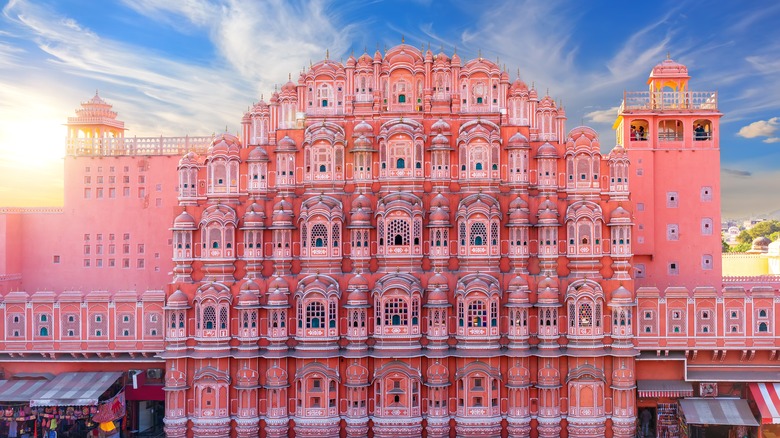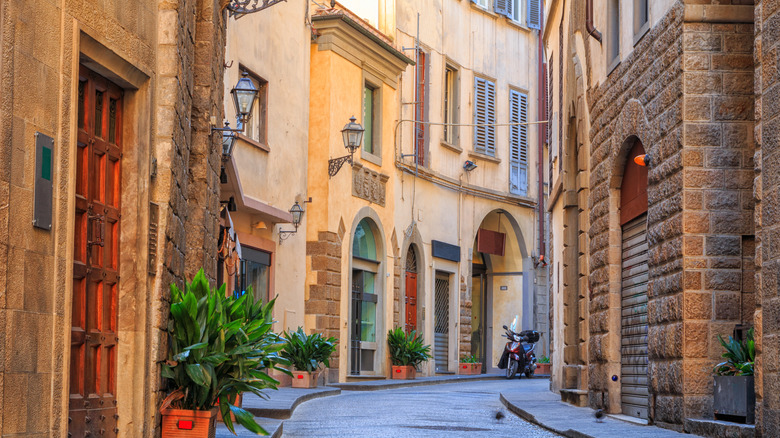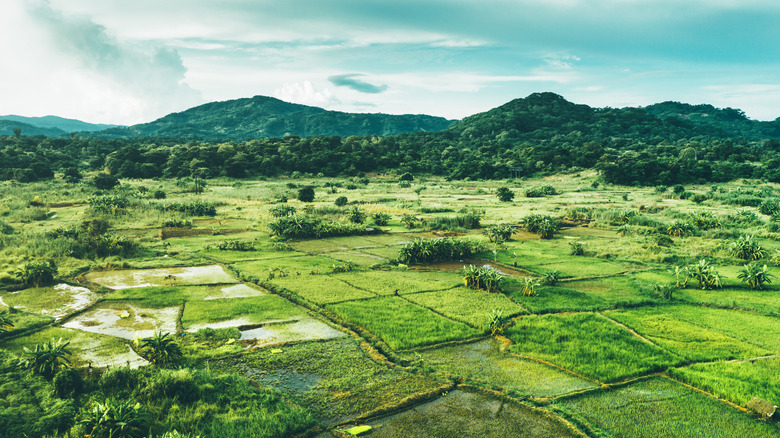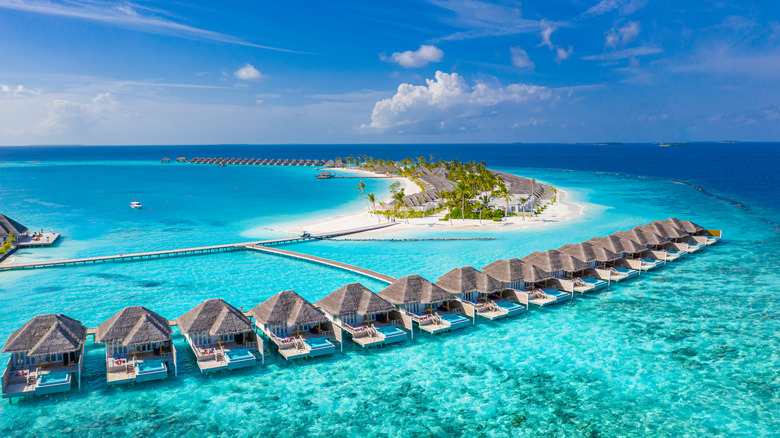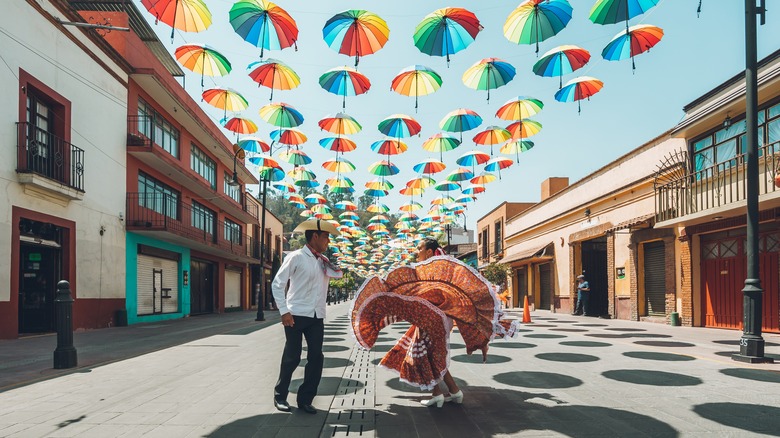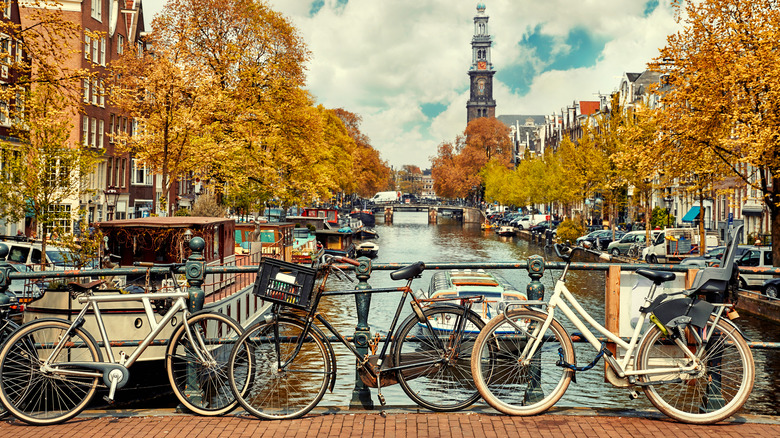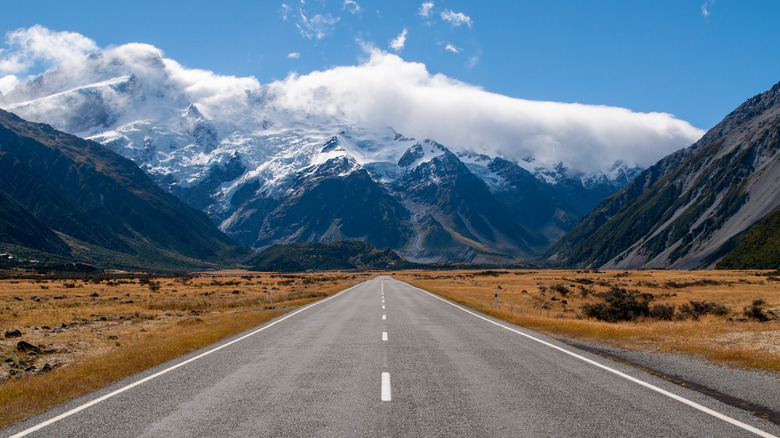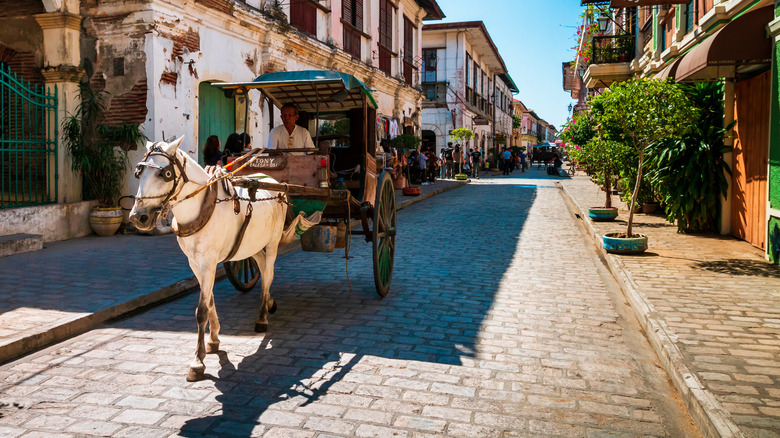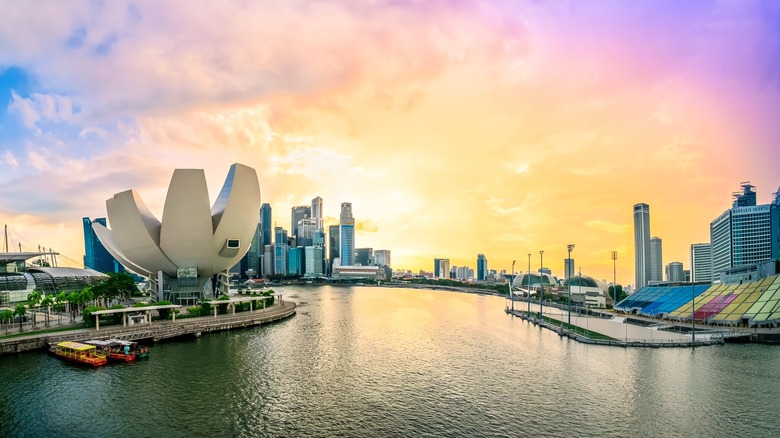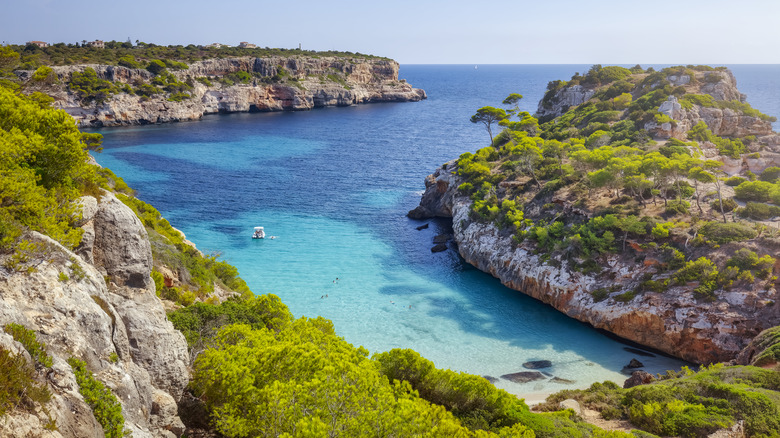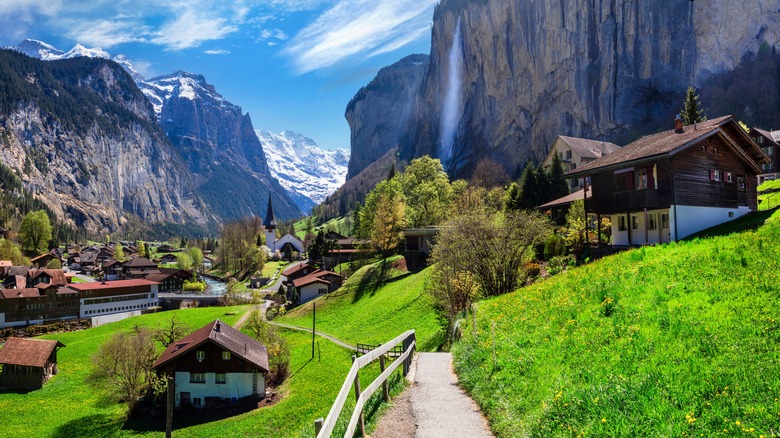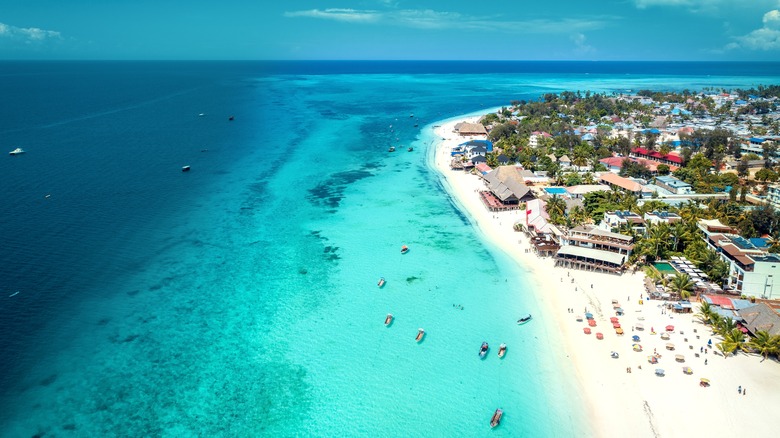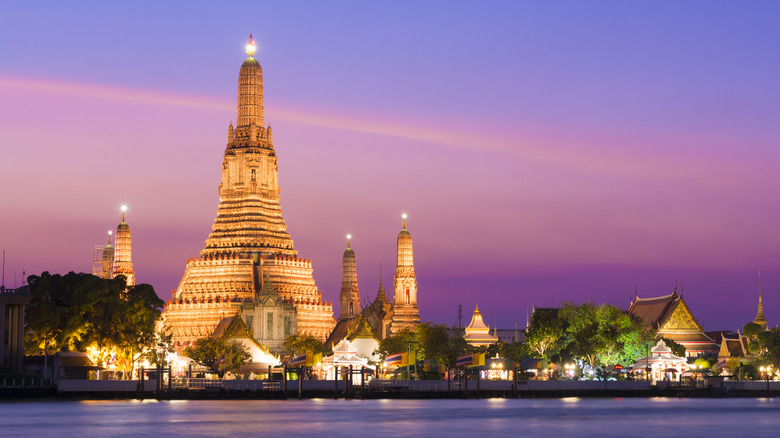Strict Laws In Other Countries That Apply To Tourists Too
The beauty of travel is to experience the variety of this planet — the chance to explore a destination that looks different from your own, where the language might sound completely unlike anything that you're used to and the food plays with your tastebuds in ways that you didn't think possible. Travel can feel like visiting another planet, and it teaches us as much about other parts of the world as it does about ourselves. Getting away is also an escape, a means of leaving behind our daily lives and immersing ourselves in new routines, places, sights, sounds, and smells. In a sense, travel is an act of courage, for travelers cede control of the familiar and learn to move to a different rhythm, governed by different rules.
Countries all over the world have evolved in their own unique ways, and while many share similarities, they also can feel poles apart. Part of that distinctness can be traced to rules, acts, and procedures open to infinite interpretations, making what is acceptable at home not so readily welcome overseas. Visitors to a country should respect the local regulations, however surprising they might seem. After all, travel is an adventure where you are the guest of another place, something we should all remember. While you might escape punishment even if you flout the law, doesn't doing that show a lack of respect for your home away from home? Here are some to look out for.
Australia
While there are no federal laws in the United States that require cyclists to wear a helmet while hitting the tarmac, that same is not true Down Under. Since 1990, the official rules insist that bikers are topped off with a sturdy helmet, and it must meet a specific safety rating — AS/NZS 2063:2020, which has the capability of taking the brunt of any force in a collision. Travelers that don't wear a helmet will not only stick out like a sore thumb since Australians are now fully in the habit of always wearing them, but they might also get fined.
Barbados
Not just reserved for soldiers in combat, camouflage clothing has long been a staple in the U.S. for teenage kids, middle-aged dads, and even celebrities like Jay-Z, Rihanna, and Bella Hadid, worn for its bright patterning rather than as a way to blend in with the surrounding urban landscapes. But in a number of Caribbean countries, including Barbados, wearing camouflage of any sort is a big thumbs-down, as it is illegal (so don't even pack any in your bags). Here, on the easternmost Caribbean island, camouflage clothing is only allowed to be worn by the military.
Canada
There's a classic old image, real or imagined, of a kid saving up coins in a giant jar and then using them to buy something cherished in a store, dutifully counting them out one by one to ensure they add up to the correct amount. Well, that kid probably didn't try that in Canada, where money may be money — but not always. In the Great White North, payment for anything more than $10 CAD made using coins that are smaller than $1 CAD is forbidden. In fact, the maximum payment amount there for anything with coins is $40 CAD.
Croatia
Sitting on a park bench, surrounded by greenery and fresh air, is a peaceful affair — a tranquil experience that could easily send a visitor to sleep. But travelers to this nation on the Adriatic Sea should think twice about catching 40 winks while on a bench in the park — following a decree in 2016, this is now something that can result in a fine of 1,000 Croatian kunas, or about $140 USD. The amount can double if you are also snoring while asleep. So much for relaxing while outdoors on vacation.
Denmark
Seen by some as an attack on religious rights, Denmark banned full coverings of the face in 2018. This includes the burqa and niqab worn by observant Muslim women — but not the hijab, which is a head covering — as well as balaclavas and full face masks, like those worn for costumes (false beards are also not allowed). Fines for non-compliance start at 1,000 Danish kroner, or about $145 USD. On special occasions, like Halloween, the rule is relaxed, so any wannabe Freddy Krueger, Michael Myers, or Ghostface can walk around at that time without fear.
France
Board shorts were created by the surfing crowd, long in the leg to help protect a wave-riders' thighs as they rub against the surfboard. This style of aquatic clothing has also been a savior for non-surfing men keen on maintaining their modesty, but for swimmers in public pools in France, they are not acceptable attire. Men at these facilities have to wear tight, fitted swimming trunks — not because they look great (who are we kidding?), but because they are more hygienic, ensuring that no dirt, sand, or other contaminants get into a pool's carefully treated water or pumping system.
Germany
Drivers with a heavy foot on the accelerator fawn over the opportunity to drive on autobahns, Germany's equivalent of the interstate. These roadways are renowned for their laissez-faire attitude when it comes to speed — large chunks of them have no limits on how fast a car can drive. The shoulders on them, however, are strictly reserved for emergencies, which doesn't include checking your cell phone (it can wait) or running out of gas (poor planning). Travelers should make sure their tanks are fully loaded before hitting the road.
Greece
This country unfurls across lands and islands around the Mediterranean and is a beautiful place to visit any time of the year for its fine topography and sumptuous, crystalline waters. It's also home to some of the best preserved ancient ruins anywhere on the planet, with the Acropolis now a landmark with global recognition. Yet keeping those pieces of history intact, and in good stead, requires vigilance and restrictions, like not allowing eating, drinking, or chewing gum. In 2009, NPR reported that 60 pounds of dried gum were removed from the seats of the majestic Odeon of Herodes Atticus amphitheater.
Grenada
At tropical beach destinations, bikini-clad sun worshippers can often be seen in their waterfront attire wandering around souvenir stores, sipping a cool iced drink or fresh coconut water at a street-side stop, or enjoying a nibble at a sidewalk cafe. And yet doing so on this island in the Caribbean is not allowed, and visitors who ignore the rule can be given a warning, asked to change, made to pay a fine that could run into hundreds of dollars — and even sent to jail. The ban, which started more than a decade ago, also extends to loose-fitting shorts and pants that show off the wearer's underwear.
Hungary
This country in Eastern Europe has recently made headlines for its authoritarian leadership, evidenced by a 2014 civil code that requires photographers to get the permission of everyone in a photo before taking it. While this may be framed as a way to respect individual privacy, some analysts believe it is simply a means to stymie what journalists can take pictures of, and the obvious implications that go with that. The law is relevant for tourists as it means that candid street shots — long a staple of amateur travel snappers the world over — will not be tolerated.
India
Having a tipple is another way to unwind while on vacation, and also a way to try some local liquid specialties. Drinking alcohol in the United States is reserved for people aged 21 and over, though the age is 18 in the United Kingdom, and 16 in some countries in continental Europe. In India — where one unique spirit is feni (made with cashew or coconut) — legal drinking is allowed from ages 18-25, depending on the state. But in some, it's completely illegal, so make sure you research the correct rules before knocking one back.
Italy
Back in 2008, a judge in an appeals court issued a ruling that no doubt had men up and down the country scratching their heads in surprise. On that day, a clothed man that had touched his crotch in public was ordered to pay a hefty fine, and the act was described as a criminal offense. While men in the country might not have completely stopped performing the act, both as a sartorial adjustment or out of habit, it is considered offensive and could lead to prosecution.
Malawi
A bill introduced in 2011 in this landlocked southeastern African country with great budget-friendly safaris aimed to tackle unclean air by stating that fouling the air in public — and close to people — would be seen as an offense. While some in authority took this to refer to actual air pollution, others argued that this also included farting, something that goes against general civility. One minister went as far as saying that people who needed to break wind should seek out a restroom to perform the fragrant act.
Malaysia
Most people have a love-hate relationship with durian, the spiky-shelled fruit that grows mostly in Southeast Asia. Indeed, its creamy, dense, rich insides have a smell that some have likened to smelly socks, gasoline, or rotting food. What is undeniable is that durians have a powerful odor, so pungent that it has been banned from most hotels in this country. Heed the signs (usually a spiky fruit inside a red circle with a red line slashed through it) and don't bring a durian into your hotel — the smell will give you away.
Maldives
Can any country in the world beat this Indian Ocean nation for its dreamy island resorts with overwater bungalows and impossibly gorgeous turquoise seas? The Maldives has long drawn travelers seeking a slice of tropical paradise, but visitors should take note that this Islamic country bans the import of all alcohol and any religious idols. If you want to have a drink, wait until you get to your resort, and for worship, conjure up the image of the relevant deity in your head.
Mexico
Cycling can be a wildly liberating experience, with bikers freed from the schedule and vagaries of public transportation, able to go where they want, when they want. The feeling of the wind rushing past your face, the elements all around, can bring a cyclist joy and even make them want to lift up their feet off the pedals in celebration. But in Mexico, such a move can get a rider into hot water, as this simple gesture is seen as not having control of the cycle, making it unsafe — and against the law.
Netherlands
This flat country in northern Europe — its name translates to "lower land" in Dutch— is a dream for cyclists, and biking is one of the most popular ways of getting around. In Amsterdam, it has even spawned its own etiquette. Strangely, there are no laws here requiring cyclists to wear a helmet while riding, but they must have a working bell on the bike, and that bell has to be easily heard quite some distance away — as much for the safety of the cyclists as for the motorists and pedestrians all around.
New Zealand
Just like the United States, New Zealand is extremely protective of its ecology, which is why a number of items are banned, for residents and visitors alike. The main concern of the government is the unwitting introduction of invasive pests and parasites, which is why border controls are so strict. Bringing food into the country is a big no-no, as are animal products like shells and raw wool. Furthermore, plants and plant seeds are prohibited, and shoes and camping equipment that have been recently used outdoors might be inspected and thoroughly disinfected (if deemed necessary) or even thrown out.
Philippines
A nation spread across the Pacific with thousands of islands and some striking beaches and seas, the Philippines has welcoming locals. There is great warmth among the people here, and visitors shouldn't do anything to upset them — not just because that would be rude, but also because it's a criminal offense. According to the country's penal code, "unjust vexation" is seen as annoying or disturbing someone without violence and can, in extreme circumstances, result in jail time and a fine. So as should always be the case, just play nice.
Singapore
Much has been made of the ban on chewing gum in this city-state just north of the equator — the enviable result of which are clean sidewalks unsullied by black, sticky stains. Also on the prohibited list is vaping — not just using a vape in public, but also being in possession of one. There are no vape shops anywhere in Singapore, and bringing one into the country is a serious offense, which can lead to a fine of up to $1,000 USD.
South Korea
To combat a rash of sordid photos taken by people without the knowledge of the subject, authorities insisted in 2023 that cameras on phones would need to make a shutter sound whenever a photo was taken. The move was a very visible and practical way to try to combat the scourge of that foul practice known as up-skirt photos. As a result, app developers were required to ensure that the sound could not be turned off when using their app.
Spain
Few smells are as pervasive on the beach as the acrid, bitter odor of cigarettes, a surefire way to ruin a beachgoer's natural experience in the sun. In 2023, the Spanish government made moves that might alleviate some of that distress by banning smoking at select beaches on the islands of Majorca, Menorca, and Ibiza. The reasons are both as a public health measure — since even second-hand smoke is dangerous — as well as one aimed at cleanliness to rid beaches and the water of toxic, chemical-laden, unsightly cigarette butts.
Switzerland
A place of immense natural beauty, Switzerland prides itself on its care for its environment, ruthless efficiency, and sense of civil respect. Civic awareness is the reason for the country's famous Nachtruhe, or night rest, rules. What this entails is that during the hours of roughly 10 p.m. to 6 a.m., noise must be kept to a minimum, and people should refrain from doing anything that might disturb neighbors — including loud get-togethers, or walking around in high heels inside an apartment.
Tanzania
A popular destination in East Africa for its wildlife viewing — this is one of the places where the Great Migration takes place each year — this country is also where to find the island of Zanzibar, whose Stone Town is a Unesco World Heritage site. Despite all these lures, same-sex couples might not feel welcome in this nation that borders eight other African countries, since homosexuality remains a criminal offense, and penalties can be as harsh as life in prison.
Thailand
Even with a prime minister as the head of the government in this Southeast Asian nation, the monarchy still wields great power over the populace, albeit not directly. This sense of regal authority is shored up in Thai law through a specific provision known as lèse majesté, whereby it is a criminal offense to speak ill of or insult anyone in the royal family, even as an ironic joke (in the end, the joke will be on you). This is a very serious matter and can lead to prison time for anyone found guilty.
Trinidad and Tobago
The twin-island nation of Trinidad and Tobago, moored off the coast of Venezuela, birthed the musical genre of calypso and the steel pan drum. It's a place of jungles and beaches, tar pits and mountains, and home to one of the most riotous carnivals on the planet. This is also where it's against the law to hang clothes to dry facing the street, listed alongside naked children and slaughtering animals as things that aren't allowed in the streets or public places.
Tunisia
This Arab country in North Africa has amazing Roman ruins dotted around its lands. Here, visitors can find a grand colosseum to rival the more famous one in Rome, a Roman city with temples and an amphitheater, and ruins of an ancient settlement set among fields of wildflowers. Unfortunately, the country has had a huge problem with the pilfering of antiquities, and, as a result, comes down hard on anyone trying to take anything out. So unless you relish the idea of fines or some prison time, don't take any antiques out of the country without the proper documents.
United Arab Emirates
An amalgam of a number of states — or emirates — this Middle Eastern nation is most famous for the emirate of Dubai, home to the world's tallest building, the Burj Khalifa. Dubai is a cosmopolitan place, with plenty of expats calling it home and international hotel chains galore, but local modesty laws still prevail. According to Dubai's Code of Conduct, kissing in public is not okay, and while holding hands is fine, smooching and petting, even between married couples, is considered counter to public decency and can result in deportation or a prison sentence. Our advice — leave the loving for the room.
